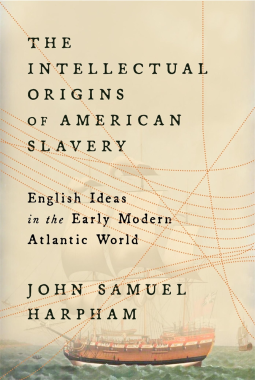
The Intellectual Origins of American Slavery
English Ideas in the Early Modern Atlantic World
by John Samuel Harpham
This title was previously available on NetGalley and is now archived.
Send NetGalley books directly to your Kindle or Kindle app
1
To read on a Kindle or Kindle app, please add kindle@netgalley.com as an approved email address to receive files in your Amazon account. Click here for step-by-step instructions.
2
Also find your Kindle email address within your Amazon account, and enter it here.
Pub Date Oct 07 2025 | Archive Date Oct 07 2025
Talking about this book? Use #TheIntellectualOriginsofAmericanSlavery #NetGalley. More hashtag tips!
Description
A landmark account of the origins of American slavery, revealing how ancient Roman ideas were used to defend the establishment of a slave empire in the English Atlantic world.
The period from 1550 to 1700 was critical in the development of slavery across the English Atlantic world. During this time, English discourse about slavery revolved around one central question: How could free persons be made into slaves? John Samuel Harpham shows that English authors found answers to this question in a tradition of ideas that stretched back to the ancient world, where they were most powerfully expressed in Roman law. These ideas, in turn, became the basis for the earliest defenses of American slavery.
The Roman tradition had located the main source of slavery in war: enslavement was the common fate of captives who otherwise faced execution. In early modern England, this account was incorporated into studies of the common law and influential natural rights theories by the likes of Hugo Grotius and John Locke. When Europeans started to publish firsthand accounts of Africa in the sixteenth century, these reports were thus received into a culture saturated with Roman ideas. Over time, English observers started to assert that the common customs of enslavement among the nations of Africa fit within the Roman model. Englishmen had initially expressed reluctance to take part in the Atlantic slave trade. But once assured that the slave trade could be traced back to customs they understood to be legitimate, they proved keen to profit from it.
An eloquent account of the moral logic that propelled the development of an immoral institution, The Intellectual Origins of American Slavery reveals the power of an overlooked tradition of ideas in the history of human bondage.
John Samuel Harpham is Lecturer on Social Studies at Harvard University.
Advance Praise
"An outstanding accomplishment in intellectual history. With bracing clarity and moral force, John Harpham recovers a forgotten landscape of thought that rendered slavery not only conceivable but also morally permissible in the English-speaking world. Like David Brion Davis before him, Harpham writes with both scholarly precision and humanistic urgency. Luminous and unsettling, this is a foundational text for anyone who seeks to understand the origins of Anglo-American slavery."
—Orlando Patterson, author of Enslavement: Past and Present
Available Editions
| EDITION | Hardcover |
| ISBN | 9780674278370 |
| PRICE | $35.00 (USD) |
| PAGES | 368 |



